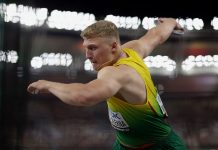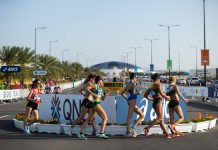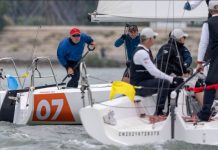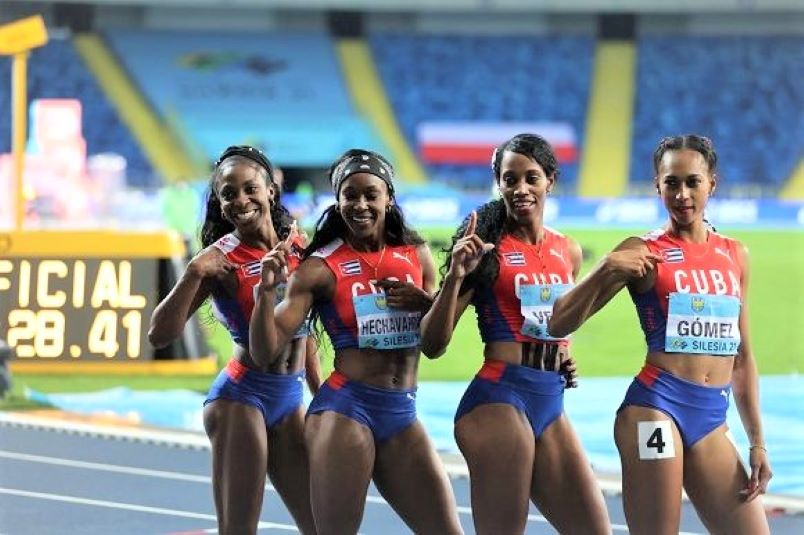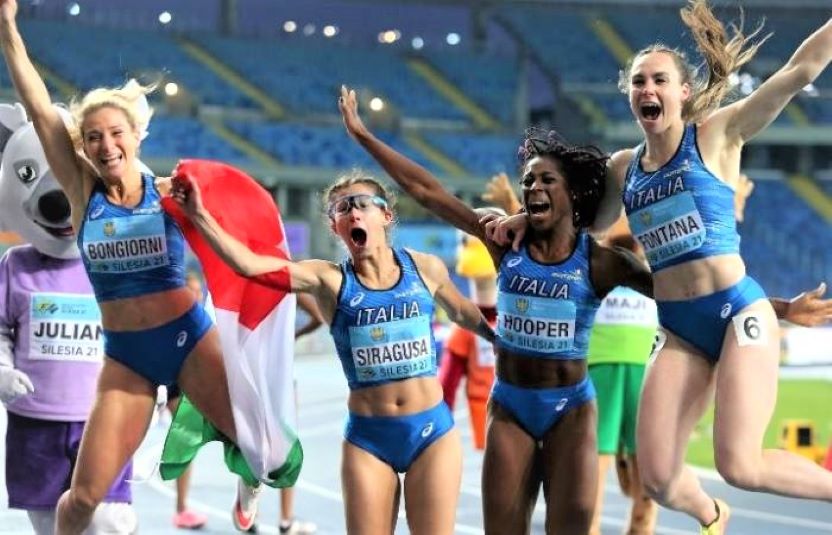 After two action-packed days at the World Athletics Relays Silesia 21, Olympic qualification has been secured and teams from around the world have begun their charge to Tokyo.
After two action-packed days at the World Athletics Relays Silesia 21, Olympic qualification has been secured and teams from around the world have begun their charge to Tokyo.
It wouldn’t be the relays without a few thrills and spills and the competition at the Silesian Stadium in Chorzow on 1-2 May certainly didn’t disappoint, with wins for Italy, Cuba, South Africa, hosts Poland, Germany and the Netherlands on Sunday, which followed triumph for Poland and Germany on day one.
Here’s how the weekend’s finals unfolded.
Full reports: Day one | Day two
Mixed masterclass from Italy
The mixed 4x400m was the first final on day two and the Italian quartet of Edoardo Scotti, Giancarla Trevisan, Alice Mangione and Davide Re – fastest in the heats – again ran four well judged legs to claim victory in 3:16.60, ahead of a fierce battle for the line between Brazil, the Dominican Republic and Belgium.
It was the perfect way for the Italian team to end their weekend as after a ninth-place finish at the World Athletics Championships Doha 2019, where the eight finalists gained Tokyo qualification, a top eight place for them in Silesia was crucial to book that Olympic Games spot. And once in the final, they made it count.
Second place was decided by a dip as Brazil’s Pan American Games 400m hurdles champion Alison dos Santos – who was fifth with 200m to go – launched himself over the line in 3:17.54 to pip Dominican Republic’s Alexander Ogando by just 0.04.
Netherlands save best for last
The Dutch men’s 4x400m team was another to have secured Olympic qualification in Silesia and they too capped a busy weekend with victory, winning the final event of the weekend in 3:03.45.
Jochem Dobber started fast for the Netherlands, as did Lythe Pillay for South Africa and Isaac Makwala for Botswana, and South Africa were just ahead at the first changeover. Strong second and third legs by Japan’s Kaito Kawabata and Kentaro Sato were significant, with the team moving up into second place.
The final leg saw South Africa’s Oscar Mavundla storm the first 150m but then he began to fade, with Tony van Diepen surging past to anchor his team home ahead of Japan and Botswana, who clocked respective times of 3:04.45 and 3:04.77.
4x400m triumph for Cuban quartet
Just 19 months after finishing a distant sixth in their heat at the World Championships in Doha, Cuba showed much improved form to win the women’s 4x400m in Silesia.
With a well-timed effort, Cuba’s quartet moved from third to second and then to first on the last three legs to win in 3:28.41, overtaking Poland and Great Britain while also holding off the Netherlands.
A 50.58 split from Femke Bol – the fastest of the race – gave the Netherlands a brief lead on leg three, but Britain’s Jessie Knight, Poland’s Natalia Kaczmarek and Cuba’s Roxana Gomez were right behind.
Knight held the lead coming into the home straight, but Gomez strode clear to take the victory for Cuba. Poland took second place, clocking 3:28.81, and Britain finished third in 3:29.27.
Italy capitalise to win women’s 4x100m
There was drama in the women’s 4x100m as the Netherlands, who had dominated the first round and had a similarly strong team contesting the final, struggled with the final changeover, leaving the way clear for Italy to join their mixed 4x400m teammates in triumph.
A solid series of handovers, from Irene Siragusa to Gloria Hooper and then Anna Bongiorni, left it down to Vittoria Fontana to bring the team home, which she did in 43.79. Poland’s Pia Skrzyszowska managed to hold off the Netherlands’ Naomi Sedney by just 0.005 as both teams clocked 44.10.
Japan finished fourth in 44.40 as Ecuador capped a historic weekend by finishing fifth, with their performance to make the final in Silesia qualifying them for Tokyo where they will be the first Ecuadorean relay team ever to compete at the Olympics.
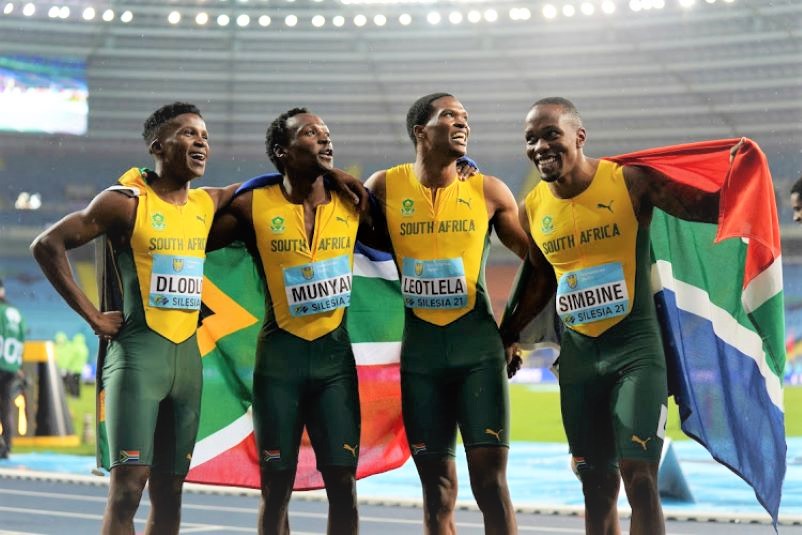 Storming anchor from Simbine gives South Africa victory in men’s 4x100m
Storming anchor from Simbine gives South Africa victory in men’s 4x100m
For the best part of 38 seconds, it looked as though Brazil would repeat their World Relays 4x100m victory from 2019. But South Africa – and anchor leg runner Akani Simbine in particular – had different ideas.
On the final leg, Paulo Andre Camilo de Oliveira received the baton with a lead of about a metre from South Africa. For most of the home straight it seemed as though Brazil would maintain their lead, but Simbine powered home and caught his Brazilian rival just before the line, winning in 38.71.
It was quite the turnaround for South Africa, who failed to qualify a team for the 2016 Olympics and 2017 World Championships.
Brazil crossed the line just 0.01 behind but the team was later disqualified for a lane infringement on the second bend. It meant Italy was promoted to second with 39.21 and Japan third with 39.42.
Poland leads women’s 4x200m from start to finish
Following the drama in the 4x100m finals, it was something of a relief that the women’s 4x200m was relatively uneventful and went pretty much to the form book.
Poland’s Paulina Guzowska gave the hosts an early lead from Ireland, then Kamila Ciba maintained their position on the second leg. A 23.34 effort from Klaudia Adamek – the fastest of the race – extended Poland’s lead to 0.6 over Ireland with Ecuador a similar distance behind in third.
Marlena Gola pulled clear of Ireland’s Sophie Becker on the last leg to bring Poland home in a national record of 1:34.98. Ireland held on for second place in 1:35.93, also a national record. Ecuador placed third in 1:36.86.
Dropped baton drama in men’s 4x200m
The same could not be said for the men’s 4x200m, which saw dropped batons by both Denmark and Poland, but there was a dominant run by Germany as Owen Ansah anchored his team to victory in 1:22.43.
It was a different quartet to that which placed third in Yokohama and here Ansah was joined by Steven Muller, Felix Straub and Lucas Ansah-Peprah.
Kenya also improved this time around, securing their best ever finish at this event with 1:24.26 for second place, the team anchored by Hesborn Ochieng.
Just behind them, Portugal – making their debut in this discipline – clocked 1:24.53 for third.
Tactical victory on home soil
There was joy for the host nation Poland on the first evening of competition, with Joanna Jozwik and Patryk Dobek teaming up to win the 2x2x400m in 3:40.92.
With two athletes taking it in turns to run their two 400m legs, the 2x2x400m is an event which favours the middle-distance athletes rather than sprinters but in 400m hurdler turned 800m man Dobek the host nation had a bit of both.
After a conservative start, Kenya were narrowly ahead after the first lap, with Naomi Korir handing the baton to Ferguson Cheruiyot Rotich and Jozwik passing on to Dobek.
Slovenia was only fielding one team in Silesia and they made their presence felt in this event, with Anita Horvat and Zan Rudolf challenging Kenya on the third and final legs. Kenya had the stronger finish, however, and it saw them finish second in 3:41.79 as Slovenia were third in 3:41.95.
Germany holds off strong Polish challenge in shuttle hurdles
All-round stronger starts and composure under pressure helped Germany to victory in the mixed shuttle hurdles relay, the final event of the first night.
Monika Zapalska began well to give Germany a slight lead on the first leg. Poland’s Zuzanna Hulisz made up a bit of ground on Zapalska towards the end of her leg, but Germany’s Erik Balnuweit got off to a swift start on the second leg, opening up another metre on Poland.
Poland saved their strongest runner, Damian Czykier, for the final leg. At first it seemed as though Gregor Traber’s lead was unassailable, but Czykier closed well in the final stages. He clattered the final barrier, though, and so was unable to catch the German before the finish.
Germany won in 56.53 with Poland taking second in 56.68. Kenya took third in 59.89.
World Athletics













